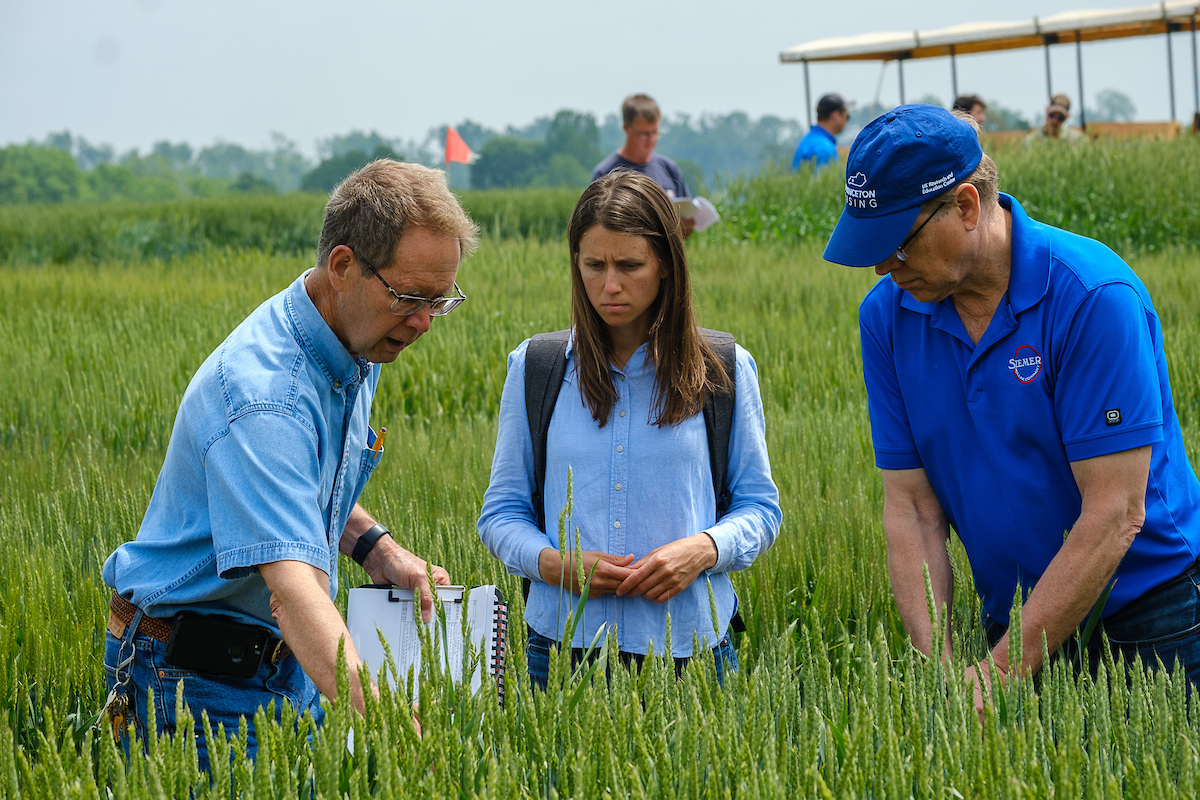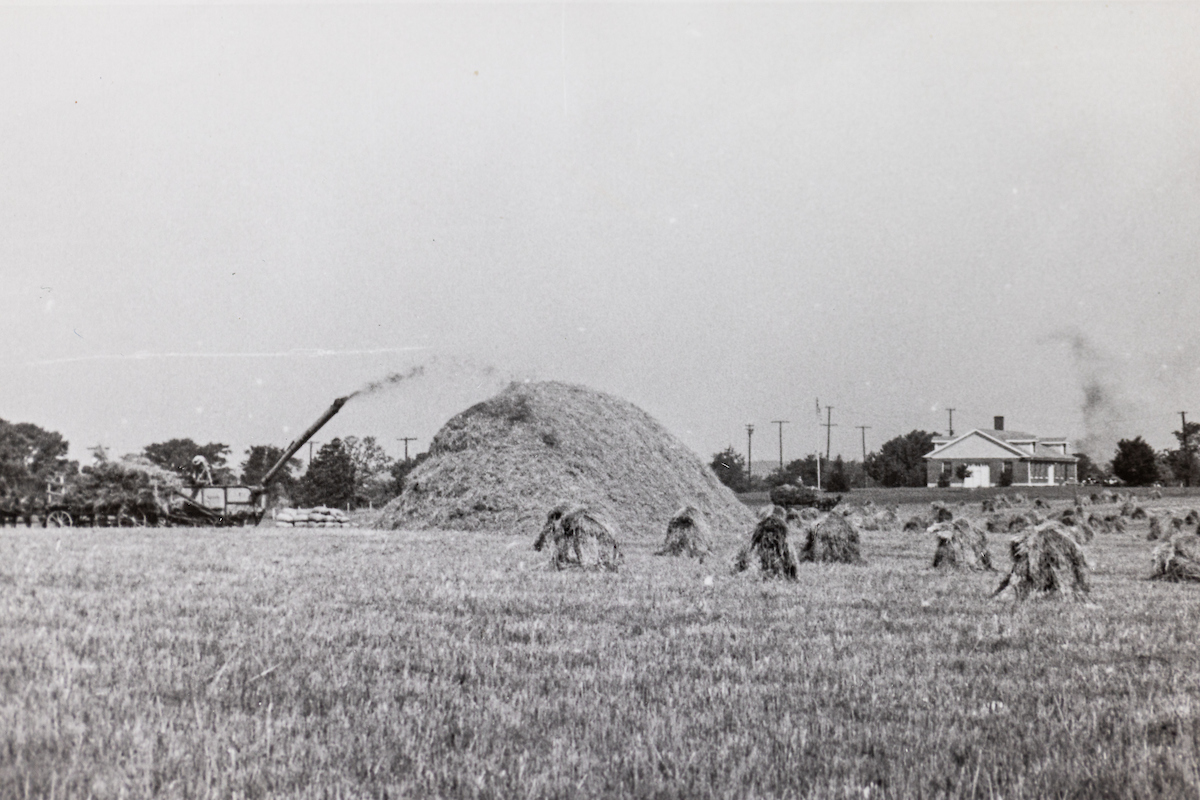University of Kentucky Research and Education Center hosts Wheat Field Day 2025 on May 13
University of Kentucky Research and Education Center hosts Wheat Field Day 2025 on May 13


The University of Kentucky Research and Education Center (UKREC) is hosting its annual Wheat Field Day on Tuesday, May 13. In addition to providing detailed sessions on the unique weather and market challenges of this year’s wheat crop, staff and experts will highlight 100 years of wheat research at UKREC.
“This event will be an opportunity for Kentucky’s wheat growers, processors, end users and UK Wheat Science Group experts to come together and talk about this year’s crop, new and ongoing research and ways to add value to Kentucky’s wheat industry,” said David Van Sanford, professor and wheat breeder in the University of Kentucky Department of Plant and Soil Sciences and co-chair of the Wheat Science Group.
Field presentations will begin at 9 a.m. CDT at 300 Extension Farm Road in Princeton. The field day will conclude at noon, and lunch will be provided by the Kentucky Small Grain Growers Association.
In addition to an update on the current crop and market outlook, topics will include nutrient management for 2025 conditions, pest management strategies, and variety analysis.
“As we all know, every year is different, and there seems to be a different problem every year,” Van Sanford said. “Wheat was under water for a number of days, and we need to address that.”
Educational credits have been approved for certified crop advisors and pesticide applicators:
- CCA - Integrated Pest Management (1) Crop Management (1.5)
- Pesticide - 1 CEU for Category 1a, 1 CEU for Category 10
100 years of wheat research, industry growth and extension

UKREC has a long history of supporting Kentucky’s wheat industry since its founding in 1925. Wheat yield trials were conducted within the first few years, and measuring yields got significantly easier when the station purchased its first threshing machine in 1927. Nitrogen fertilization in wheat began in 1943.
Once no-till research had been established on corn and soybeans at UKREC in the 1960s, agronomists Charles Tutt and James Herbek turned their attention to planting double-crop soybeans behind wheat in the 1970s, which led to intensive and no-till wheat production led by Herbek and Lloyd Murdock in the 1980s.
Van Sanford, who joined the Lexington Plant and Soil Science staff in 1981 to develop soft red winter wheat varieties for the region, said several factors came together in the 1980s that set Kentucky on a path to successful, profitable wheat production.
“In 1985, the late Billy Joe Miles, a visionary agribusinessman, took a group of growers to England to observe and learn about wheat production there,” Van Sanford said. “This was followed by the arrival of the first of a set of British wheat consultants. Suddenly, it seemed there was a critical mass of growers, researchers, and consultants who wanted to put Kentucky on the map as a premier location for the production of high-quality soft red winter wheat.”
Thanks to encouragement and support from passionate farm leaders, the multi-disciplinary Wheat Science Group was formed in the early 1990s. Soils, genetics, pests and plant growth experts united to significantly raise the average wheat yields and no-till wheat acres in the Commonwealth.
The real game-changer, Van Sanford said, was that Siemer Milling Company opened a Kentucky mill in Hopkinsville in 1995 in response to improved wheat production and quality. Within a few years, wheat flour buyer Continental Mills built a processing plant next door; the flour milled at Siemer travels by pipe to Continental for use in easy-to-make baking mixes.
It was also about this time that the Wheat Science Group, coordinated by staff at UKREC, began hosting the Wheat Field Day. Van Sanford said they initially invited farmers, production consultants, and wheat buyers to farms in the southern-tier counties, where wheat production was more prominent.
The Wheat Field Day’s permanent home eventually landed at UKREC in Princeton and remains the premier event to share the latest wheat research and management information for Kentucky growers and processors.
A more detailed history of UKREC’s and the UK Wheat Science Group’s research and extension work can be found at https://ukrec.ca.uky.edu. Learn more about this year’s Wheat Field Day at https://ukrec.ca.uky.edu/events/2025-wheat-field-day
###
Writer: Jennifer Elwell, jennifer.elwell@uky.edu
 The University of Kentucky Research and Education Center (UKREC) at Princeton is proudly celebrating 100 years of advancing agricultural extension, research, education, leadership and service to the Commonwealth. Founded in 1925, UKREC is part of the Martin-Gatton College of Agriculture, Food and Environment, as well as the Kentucky Agricultural Experiment Station and the Kentucky Cooperative Extension Service. A vital part of the Princeton community, UKREC’s impact extends across Kentucky and beyond. To mark this milestone, Martin-Gatton CAFE will host a variety of events and training sessions throughout the year, showcasing UKREC’s legacy of excellence and ongoing commitment to UK’s mission of improving lives through teaching, research and extension.
The University of Kentucky Research and Education Center (UKREC) at Princeton is proudly celebrating 100 years of advancing agricultural extension, research, education, leadership and service to the Commonwealth. Founded in 1925, UKREC is part of the Martin-Gatton College of Agriculture, Food and Environment, as well as the Kentucky Agricultural Experiment Station and the Kentucky Cooperative Extension Service. A vital part of the Princeton community, UKREC’s impact extends across Kentucky and beyond. To mark this milestone, Martin-Gatton CAFE will host a variety of events and training sessions throughout the year, showcasing UKREC’s legacy of excellence and ongoing commitment to UK’s mission of improving lives through teaching, research and extension.
The Martin-Gatton College of Agriculture, Food and Environment is an Equal Opportunity Organization with respect to education and employment and authorization to provide research, education information and other services only to individuals and institutions that function without regard to economic or social status and will not discriminate on the basis of race, color, ethnic origin, national origin, creed, religion, political belief, sex, sexual orientation, gender identity, gender expression, pregnancy, marital status, genetic information, age, veteran status, physical or mental disability or reprisal or retaliation for prior civil rights activity.
Agricultural Economics Entomology Events Extension Plant & Soil Sciences Research UKREC


